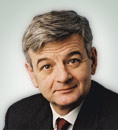The Global Economy’s Tale Risks
TOKYO – Fluctuations in the world’s economies are largely due to the stories we hear and tell about them. These popular, emotionally relevant narratives sometimes inspire us to go out and spend, start businesses, build new factories and office buildings, and hire employees; at other times, they put fear in our hearts and impel us to sit tight, save our resources, curtail spending, and reduce risk. They either stimulate our “animal spirits” or muffle them.
Visiting Japan on a speaking tour, I am struck by the positive impact of the economy-related stories on people’s thinking and behavior, and also by how fragile that change is. Since Prime Minister Shinzo Abe assumed office in December 2012 and launched his program of monetary and fiscal stimulus and structural reform, the impact on Japanese confidence has been profound. According to the International Monetary Fund, the output gap – the difference between actual and potential GDP – narrowed from -3.6% in 2011 to -0.9% in 2013.
Most of the rest of the world lacks a comprehensive, easily understood narrative of positive change similar to Japan’s “Abenomics.” The output gap for the world’s major advanced economies, as calculated by the IMF, remains disappointing, at -3.2% in 2013, which is less than half-way back to normal from 2009, the worst year of the global financial crisis, when the gap was -5.3%.
We seem to be at the mercy of our narratives. Ever since 2009, most of us have just been waiting for some story to turn our hearts aglow with hope and confidence – and to reinvigorate our economies.
Think of the story of the real-estate boom in the United States and other countries in the first half of the 2000’s. This was a story not of a “bubble”; rather, the boom was a triumph of capitalist enterprise in a new millennium.
These stories were so powerful because a huge number of people were psychologically – and financially – invested in them. Most families owned a house, so they were automatically participating in the boom. And many homeowners, eager to participate even more in the boom and feel like savvy capitalists, bought more expensive houses than they normally would.
With the abrupt end of the boom in 2006, that ego-boosting story also ended. We were not all investing geniuses after all. It was just a bubble, we learned. Our confidence in ourselves, and hence in our futures, took a hit, discouraging economic risk-taking.
Then the financial crisis erupted, scaring the entire world. A story of opportunity and riches turned into one of corrupt mortgage lenders, overleveraged financial institutions, dimwitted experts, and captured regulators. The economy was careening like a rudderless ship, and the sharp operators who had duped us into getting on board – call them the 1% – were slipping away in the only lifeboats.
By early 2009, the plunge in stock markets around the world reached its nadir, and fear of a deep depression, according to the University of Michigan Consumer Sentiment Survey, was at its highest level since the second oil crisis in the early 1980’s. Stories of the Great Depression of the 1930’s were recalled from our dimmest memories – or from our parents’ and grandparents’ memories – and retold.
To understand why economic recovery (if not that of the stock market) has remained so weak since 2009, we need to identify which stories have been affecting popular psychology. One example is the rapid advance in smartphones and tablet computers. Apple’s iPhone was launched in 2007, and Google’s Android phones in 2008, just as the crisis was beginning, but most of their growth has been since then. Apple’s iPad was launched in 2010. Since then, these products have entered almost everyone’s consciousness; we see people using them everywhere – on the street and in hotel lobbies, restaurants, and airports.
This ought to be a confidence-boosting story: amazing technologies are emerging, sales are booming, and entrepreneurship is alive and very well. But the confidence-boosting effect of the earlier real-estate boom was far more powerful, because it resonated directly with many more people. This time, in fact, the smartphone/tablet story is associated with a sense of foreboding, for the wealth that these devices generate seems to be concentrated among a tiny number of tech entrepreneurs who probably live in a faraway country.
These stories awaken our fears of being overtaken by others on the economic ladder. And now that our phones talk to us (Apple launched Siri, the artificial voice that answers your spoken questions, on its iPhones in 2010), they fuel dread that they can replace us, just as earlier waves of automation rendered much human capital obsolete.
I had the pleasure of meeting with Abe on this trip. He sticks to the script, telling a story of taking aggressive and definitive action against an economic malaise that has plagued Japan for decades. He inspires confidence; I felt it immediately.
Abe is also described as reviving national patriotism, even nationalism. Though I heard none of this from him in my meeting, I think it may be a central part of his story, too. Nationalism, after all, is intrinsically bound up with individual identity. It creates a story for each member of the nation, a story about what he or she can do as part of a successful country. Some of Abe’s most controversial steps, such as visiting the Yasukuni Shrine despite Chinese and Korean objections, only increase the story’s impact.
Still, it is not easy for national leaders, even those with Abe’s talents, to manage such stories, just as it is hard for film producers to make a blockbuster every time. No leader can consistently shape the narratives that affect the economy. But that does not rule out the need to try.
Copyright: Project Syndicate, 2014.
www.project-syndicate.org
This article is brought to you by Project Syndicate that is a not for profit organization.
Project Syndicate brings original, engaging, and thought-provoking commentaries by esteemed leaders and thinkers from around the world to readers everywhere. By offering incisive perspectives on our changing world from those who are shaping its economics, politics, science, and culture, Project Syndicate has created an unrivalled venue for informed public debate. Please see: www.project-syndicate.org.
Should you want to support Project Syndicate you can do it by using the PayPal icon below. Your donation is paid to Project Syndicate in full after PayPal has deducted its transaction fee. Facts & Arts neither receives information about your donation nor a commission.




















